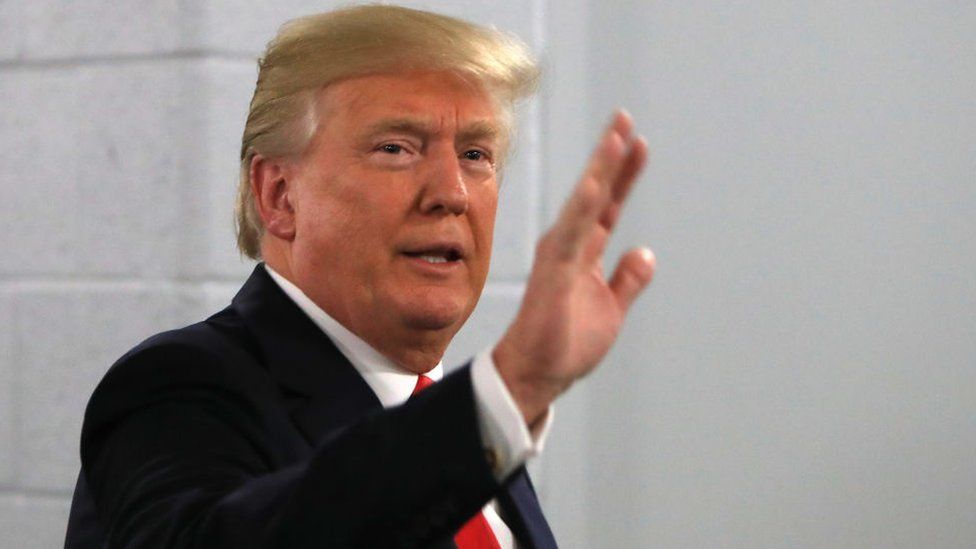Davos: A rough guide to the World Economic Forum
- Published

It's that time of year when the rich, powerful and downright famous head to Swiss mountain village to discuss the big issues of the day and attempt to put the world to rights.
The World Economic Forum (WEF) has grown from a small huddle in the 1970s, when it was started by the academic Klaus Schwab, to hosting more than 3,000 participants, of which 900 are chief executives or company chairs and more than 70 are world leaders.
Davos, where the meeting takes place, has now become shorthand for the forum's official title.
This year, the big news is that US president Donald Trump is coming - the first sitting US president to attend the annual gathering in almost two decades.
He'll be jostling for pole position against the likes of Indian Prime Minister Narendra Modi and French President Emmanuel Macron.
UK Prime Minister Theresa May and new Zimbabwean President Emmerson Mnangagwa are also attending.
Other well-known participants include actor Cate Blanchett, musician Will.i.am and singer Sir Elton John.
This year, the forum's official theme is: "Creating a shared future in a fractured world."
Sexual harassment and gender inequality amid the #MeToo movement, the impact of advances in technology and globalisation as well as the differing world views of major politicians are likely to feature heavily.
What's it like and what happens there?
As you can imagine, there are lots of meetings, surrounded by varying degrees of secrecy. The public ones - which anyone can attend. The closed ones - which only those participants with a white badge can attend (i.e. they've paid to attend the conference or have been invited) and then the private ones that you don't even know have happened. Those are where the big deals are discussed, behind closed doors.
Yes, but what really happens there?
Well, in addition to all the talking there is a lot of partying - and mostly you don't have to pay. Companies who are attending the conference put on dinners and drinks to provide a networking opportunity for their clients. So yes there is food and drink on tap, but they're not exactly parties to write home about. Unless chief executives shaking their thing does it for you.
Occasionally a big name band - such as The Killers - will appear to liven things up. But it's hardly Glastonbury - still mostly men in suits loitering around some canapes.
A talking and dancing shop then?
Maybe. But the idea behind the gathering is to spark ideas and conversations - it doesn't pretend to solve them there and then. Perhaps the best-known example of this is of Turkey not going to war with Greece when tensions escalated between the two in the 1980s. The oft-cited reason is that former Turkish Prime Minister Turgut Ozal had met his Greek counterpart Andreas Papandreou in Davos and felt he could trust him.
More recently, the Brics New Development Bank - an alternative to the World Bank and the IMF - was conceived during a conversation between economists Lord Stern and Joseph Stiglitz in Davos in 2011.
I've got a few good ideas in which Mr Gates might be interested, how do I get to go?
Well, you either have to be invited - and to do that, assuming you're not a world leader or chief executive, you probably need to be running a socially minded company or NGO. Or you can get your company to pay 27,000 Swiss francs (£20,250; $28,000), plus membership of the World Economic Forum and a very expensive hotel.
One famous venture capital firm spends at least £500,000 keeping its investors happy at the event.
If you haven't got that kind of money, you can still just turn up in a camper van, as some people plan to, and attend the fringe events.
Wait, a camper van? I thought you said this wasn't Glastonbury?
It's amazing the lengths people will go to to get a within a snowball's throw of the rich and famous. Planning starts months in advance and is carefully co-ordinated. You can get what's known as a "hotel badge" which does not give you access to the conference itself, but gets you past hotel security where the parties are held.
Wow, is it worth it?
Well, for the businesses that go, it's easier than flying all around the world to see your clients. Here, they're all in one place.
For the hangers-on, at the very least you get to meet other ambitious hopefuls.
OK, so supposing I manage to wangle an invite, what do I need to know?
It's busy - the day usually starts with a breakfast invite for 7am and, if you're lucky, ends in the early hours at a party.
It's cold - ski gear is ideal. But of course this is a conference and as soon as you get inside it's really warm so finding the appropriate clothing can be tricky. Many people carry a change of shoes in their bag and, as the fashion pages say, it's all about layers.
Ahhh, I knew it, it's really about skiing isn't it?
Surprisingly few people actually indulge - and I'm told the slopes are mostly empty. By the weekend, some delegates venture up there - the head of OECD think-tank, Angel Gurria, can usually be found gliding down the mountain.
- Published9 January 2018